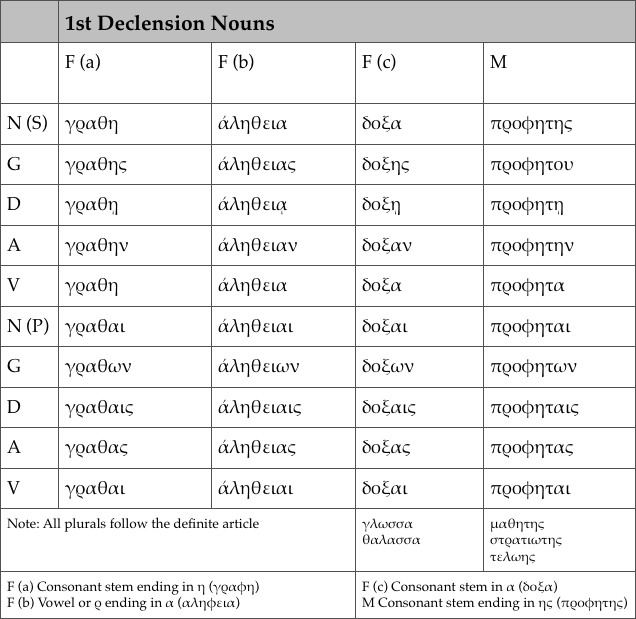“Remember: the main difference between someone who keeps their Greek and someone who loses it is the commitment to give it a little time each day. Are you up for it? Reverse the decline and your Greek will shine.” —Con Campbell, Keep Your Greek: Strategies for Busy People.
Foundational Koine Greek Exercises:
(Exercises related to the basic building blocks of Koine Greek)
Recite the Greek Alphabet.
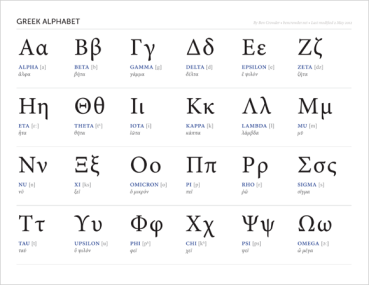
Write out or recite the Article.
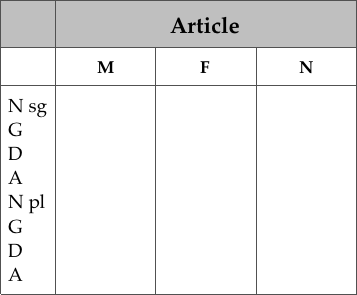
Write out or recite the following select Prepositions with their cases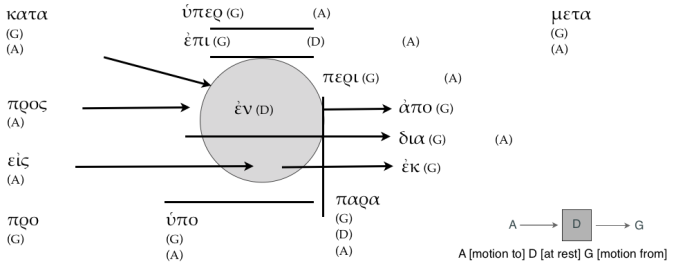
Write out or recite the 1st & 2nd Person, Personal Pronouns
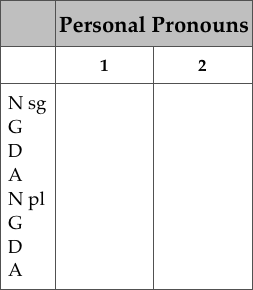
Write out or recite the paradigm for the verb I am.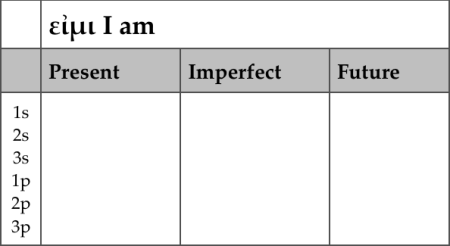
Conjunctions and Particles by Frequency
You can also test your knowledge using the Quizlet set Conjunctions and Particles
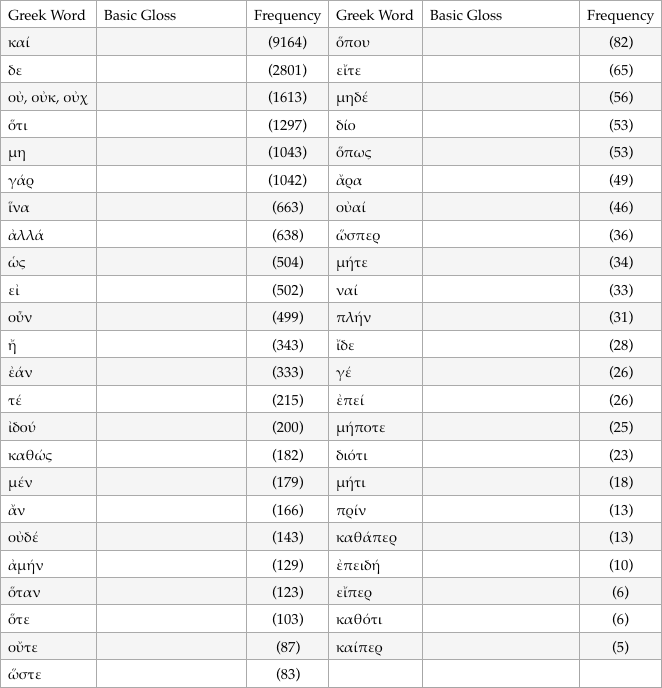
Principal Parts – Top 30 by Word Frequency:
Write out or recite the principal parts for γινομαι—to become
(#3–Used 699 times in NT)
(Present Active)
(Future Active)
(Aorist Active)
(Perfect Active)
(Perfect Passive)
(Aorist Passive)
Paradigms:
1) Write out or recite the 1st singular verbs of λυω – to loose, in the: Indicative, Subjunctive, Imperative and Infinitive moods
2) Write out or recite the Nominative Masculine Participles of λυω – to loose
Note: The idea of remembering the 1st singular verbs and Nominative Masculine Participles is that often if you can remember these then reciting the remaining conjugates and declensions should be relatively straightforward, particularly if you have put the time in previously to retain them. If you would like to check the full paradigms now then take a look at the Paradigms PDF
Greek Reading and Translation
Each day read through the 10 verses below and translate each of them over the coming week. (To assist with your translation you can work directly in an Excel spreadsheet or print off a PDF copy for handwritten translations)
Excel: (105) Matthew 5.1–5.10
PDF: (105) Matthew 5.1–5.10
Matthew 5:1–10 (NA28) — 1 Ἰδὼν δὲ τοὺς ὄχλους ἀνέβη εἰς τὸ ὄρος, καὶ καθίσαντος αὐτοῦ προσῆλθαν αὐτῷ οἱ μαθηταὶ αὐτοῦ· 2 καὶ ἀνοίξας τὸ στόμα αὐτοῦ ἐδίδασκεν αὐτοὺς λέγων· 3 Μακάριοι οἱ πτωχοὶ τῷ πνεύματι, ὅτι αὐτῶν ἐστιν ἡ βασιλεία τῶν οὐρανῶν. 4 μακάριοι οἱ πενθοῦντες , ὅτι αὐτοὶ παρακληθήσονται. 5 μακάριοι οἱ πραεῖς, ὅτι αὐτοὶ κληρονομήσουσιν τὴν γῆν. 6 μακάριοι οἱ πεινῶντες καὶ διψῶντες τὴν δικαιοσύνην, ὅτι αὐτοὶ χορτασθήσονται. 7 μακάριοι οἱ ἐλεήμονες, ὅτι αὐτοὶ ἐλεηθήσονται. 8 μακάριοι οἱ καθαροὶ τῇ καρδίᾳ, ὅτι αὐτοὶ τὸν θεὸν ὄψονται. 9 μακάριοι οἱ εἰρηνοποιοί, ὅτι αὐτοὶ υἱοὶ θεοῦ κληθήσονται. 10 μακάριοι οἱ δεδιωγμένοι ἕνεκεν δικαιοσύνης, ὅτι αὐτῶν ἐστιν ἡ βασιλεία τῶν οὐρανῶν.
Matthew 5:1–10 (ESV) — 1 Seeing the crowds, he went up on the mountain, and when he sat down, his disciples came to him. 2 And he opened his mouth and taught them, saying: 3 “Blessed are the poor in spirit, for theirs is the kingdom of heaven. 4 “Blessed are those who mourn, for they shall be comforted. 5 “Blessed are the meek, for they shall inherit the earth. 6 “Blessed are those who hunger and thirst for righteousness, for they shall be satisfied. 7 “Blessed are the merciful, for they shall receive mercy. 8 “Blessed are the pure in heart, for they shall see God. 9 “Blessed are the peacemakers, for they shall be called sons of God. 10 “Blessed are those who are persecuted for righteousness’ sake, for theirs is the kingdom of heaven.
Grammar
A Beginning-Intermediate Grammar of Hellenistic Greek
Each day this week, skim read through a chapter of your first Greek grammar, one you are familiar with or you could work your way through Robert W. Funk’s grammar (See above link).
Keep Your Greek (105)
Continue reading for Quiz answers.
Answers to Keep Your Greek (105)
Foundational Koine Greek Exercises:
(Exercises related to the basic building blocks of Koine Greek)
Recite the Greek Alphabet.

Write out or recite the Article.
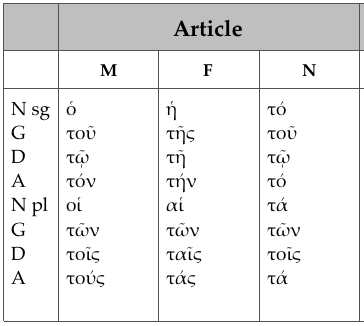
Write out or recite the following selected Prepositions with their cases
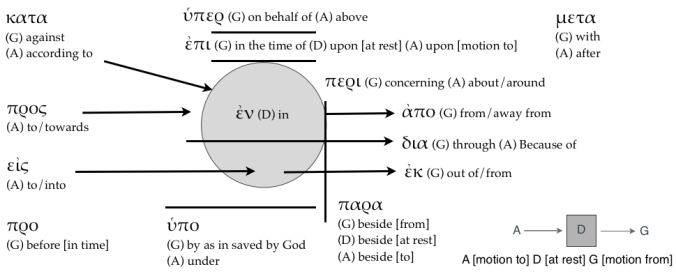
Write out or recite the 1st & 2nd Personal Pronouns
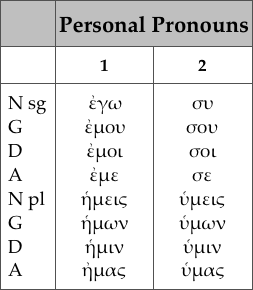
Write out or recite the paradigm for the verb I am.
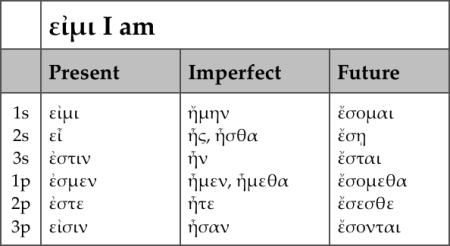
Conjunctions and Particles by Frequency
You can also test your knowledge using the Quizlet set Conjunctions and Particles
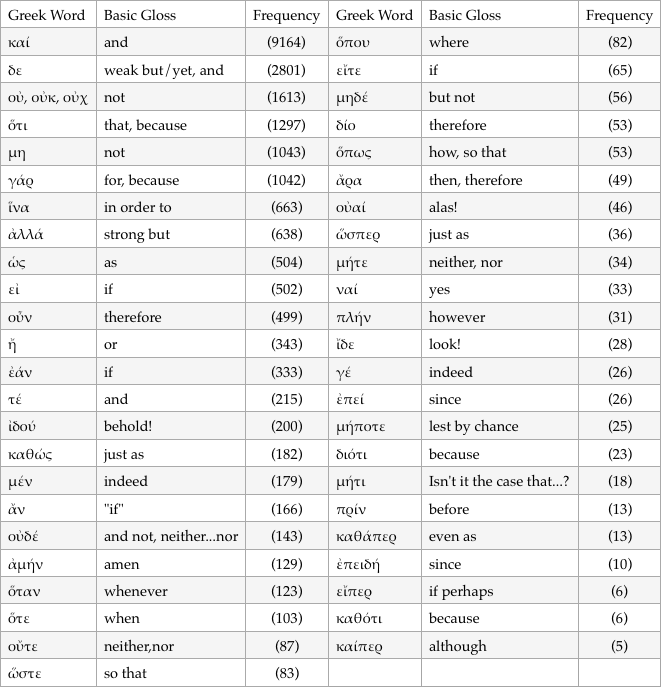
Principal Parts – Top 30 by Frequency:
Write out or recite the principal parts for γινομαι—to become
(#3–Used 699 times in NT)
(Present Active) γινομαι
(Future Active) γενησομαι
(Aorist Active) ἐγενομην
(Perfect Active) γεγονα
(Perfect Passive) γεγενημαι
(Aorist Passive) ἐγενηθην
Paradigm Exercises:
1) Write out or recite the 1st singular verbs of λυω – to loose, in the: Indicative, Subjunctive, Imperative and Infinitive moods
2) Write out or recite the Nominative Masculine Participles of λυω – to loose
Indicative Mood – Affirms the reality of an action
λυω, ἐλυον, λυομαι, ἐλυομην, λυσω, λυσομαι, ἐλυσα, ἐλυσαμην, λελυκα,(ἐ)λελυκειν, λελυμαι, (ἐ)λελυμην, ἐλυθην, λυθησομαι
Subjunctive Mood – Indicates the probability of an action
λυω, λυωμαι, λυσω, λυσωμαι, λυθω
Imperative Mood – Expresses a command for action
λυε, λυου, λυσον, λυσαι, λυθητι
Infinitive (Mood) – Verbal noun (no conjugates)
λυειν, λυεσθαι, λυσαι, λυσασθαι, λελυκεναι, λελυσθαι, λυθηναι
Participles (Mood) – Verbal adjective
Present Participles
[3 1c 3] (A) λυων, λυουσα, λυον
[2 1a 2] (MP) λυομενος, λυομενη, λυομενον
1st Aorist Participles
[3 1c 3] (A) λυσας, λυσασα, λυσαν
[2 1a 2] (M) λυσαμενος, λυσαμενη, λυσαμενον
[3 1c 3] (P) λυθεις, λυθεισα, λυθεν
2nd Aorist Participles
[3 1c 3] (A) βαλων, βαλουσα, βαλον
[2 1a 2] (M) βαλομενος, βαλομενη, βαλομενον
[3 1c 3] (P) βληθεις, βληθεισα, βληθεν
Perfect Participles
[3 1b 3] (A) λελυκως, λελυκυια, λελυκος
[2 1a 2] (MP) λελυμενος, λελυμενη, λελυμενον
Notes: The [3 1c 3] key is how they decline i.e., 3rd declension, 1st declension, 3rd declension. The 1st declension follows the standard grammatical pattern. (1a) Consonant stem ending in η as in γραφη. (1b) Vowel or ρ ending in α as in αληφεια. (1c) Consonant stem in α as in δοξα.
Use the Paradigms PDF to check the full paradigms
